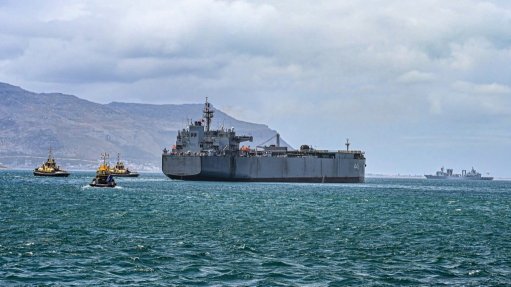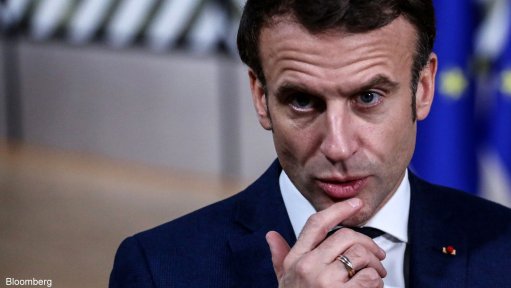Trump tariffs shake Africa
US President Donald Trump’s push-me-pull-you tariffs come after slashing USAid, closing the Voice of America radio station and a rumoured end to US Africa Command, or Africom. US withdrawal from Africa is near complete, leaving a continent-wide trade, aid, military and soft power vacuum waiting to be filled.
Trump’s tariffs lack any discernible economic policy or strategic coherence and play only into his long-held belief that trade deficits are bad. The tariffs will cause uncertainty and long-term damage to the few African countries – all US allies – that have sought to benefit from the African Growth and Opportunity Act (Agoa), which offers free trade access to the US. Trump’s tariff allocations were based on a bizarre calculation that divided countries’ trade deficits by exports to the US and have wiped out Agoa benefits.
Trump was cavalier as $10-trillion was wiped off global market values between his so-called Liberation Day on April 2 and April 10, when a US bond markets backlash forced him to suspend the more egregious tariffs for 90 days. That leaves universal 10% tariffs and targeted tariffs (Mexico, Canada, aluminium and car parts) in place and a new era of frenzied uncertainty. Bloomberg estimates the average real tariff increase is 27% – the highest in 100 years. Economists equate the global shock Trump has caused to the 2008 banking crash, the Covid pandemic shutdown, and Russia’s invasion of Ukraine. US banks warn the US is facing recession, making achievement of Trump’s goal of “bringing manufacturing back home” unlikely. What is certain is the end of the longest era of consistently lower tariffs dating back to the 1940s, one of the most important factors in the vast expansion of global trade and spreading global wealth.
No country illustrates incoherence in Trump’s tariff policy better than Lesotho, the country he claimed in his State of the Union address that “nobody has ever heard of”. Lesotho was an Agoa success story until it was hit by a 50% Trump tariff on its US exports – Africa’s highest tariff imposed on one of its poorest countries. Lesotho had successfully built a $2.2-billion economy on the back of Agoa, manufacturing US brands, notably Wrangler and Levi jeans and, ironically, Trump’s golf gear. However, over half of Lesotho’s population lives in poverty and is unable to afford US-made goods, so Lesotho runs a trade deficit. Last year, it imported $2.8-million worth of goods from the US for export earnings of $230-million.
Trump lists South Africa and Nigeria, accounting for almost half of US imports from Africa, as the worst trade deficit offenders, yet their tariffs are lower than Lesotho’s. They face tariffs of 31% and 14% respectively but may benefit from some protection from exemptions on critical minerals and oil and gas. Nevertheless, upending ready access to US markets, on which an estimated 100 000 South African jobs rely, is clearly problematic.
Global chaos manifests in Africa in volatile commodities prices, which benefit some and punish others. Trump tariffs have prompted a global flight into gold, pushing the gold price even higher and bringing relief for some of Africa’s gold producers but causing fears of a recession and an oil price slump, which will hit Nigeria, Angola and Algeria.
Trump tariffs made no adjustment for services or for the complexity of modern international trade or rules of origin, which means some countries will face multiple impacts. For example, the US is the largest market for Botswana’s diamonds, eliciting a 37% Trump tariff. Yet, Botswana’s diamonds are not sold directly to the US but via the United Arab Emirates, India, Belgium and Israel, on which Trump tariffs are 10%, 26%, 20%, and 17% respectively. Botswana is already struggling with weak demand, and a likely recession in the US will probably further dampen demand for diamonds. The shock may lead Botswana to discount rough diamonds to remain competitive, eroding profit margins and adding pressure to its Budget, already facing an unprecedented deficit. Lesotho, Botswana, South Africa, Eswatini and Namibia are all members of the Southern African Customs Union (Sacu) and have a revenue-sharing mechanism. Economic collapse in Lesotho could affect fellow Sacu countries.
Africa’s most pro-US countries are thus left scrabbling for new trade and development partners. For years, US academics have reported that most African governments have underused Agoa, meaning many will be less vulnerable than those that actively sought to develop the US as a market. Former President Joe Biden ended Gabon’s access to Agoa for a military coup and Uganda’s for human rights abuses – with little discernible impact. In fact, international shortages due to climate change have seen Uganda’s coffee exports increase by 5% in volume and 60% in value terms. Gabon has barely winced.
The rush is on for other Agoa beneficiaries like South Africa and Namibia to find new markets. The US is neither Namibia’s largest import source nor export destination; Namibia imported $160.5-million of goods from the US in 2024 and exported $275.2-million worth of goods – but that deficit earned the country a 21% Trump tariff, wiping out the benefits of Agoa. Namibia mainly exports beef, lamb, fish, grapes and blueberries to the US, and the country is already looking to increase exports to the EU and China. However, for all the affected African economies, the greatest opportunity for alternative markets is the rest of Africa under the Africa Continental Free Trade Agreement (AfCFTA), which already offers tariff-free access for key exports. Meanwhile, in anticipation of Trump’s Liberation Day, South Africa and European Commission president Ursula von der Leyen met in late March to start talks on a new generation of trade deals, which will focus on investment, the clean energy transition, skills and technology, and developing strategic industries.
Arguably, the vacuum in trade, aid, and military and soft power could be filled by South Africa, Nigeria, Kenya, Egypt or Morocco – the continent’s largest and most diverse economies. South Africa could redevelop its defence industry and military capacity to fill the gap left by Africom. All affected countries could mitigate the effects of the Trump tariffs with the speedy implementation of AfCFTA. But in pole position to fill the gap is China – now Africa’s main trading partner, posting bilateral trade of $292-billion in 2024, compared to $80-billion for US-Africa trade.
China has become the preferred trading partner of 52 African countries – up from 18 countries in 2003. Last year, China scrapped tariffs on goods from 33 African countries.
Article Enquiry
Email Article
Save Article
Feedback
To advertise email advertising@creamermedia.co.za or click here
Comments
Press Office
Announcements
What's On
Subscribe to improve your user experience...
Option 1 (equivalent of R125 a month):
Receive a weekly copy of Creamer Media's Engineering News & Mining Weekly magazine
(print copy for those in South Africa and e-magazine for those outside of South Africa)
Receive daily email newsletters
Access to full search results
Access archive of magazine back copies
Access to Projects in Progress
Access to ONE Research Report of your choice in PDF format
Option 2 (equivalent of R375 a month):
All benefits from Option 1
PLUS
Access to Creamer Media's Research Channel Africa for ALL Research Reports, in PDF format, on various industrial and mining sectors
including Electricity; Water; Energy Transition; Hydrogen; Roads, Rail and Ports; Coal; Gold; Platinum; Battery Metals; etc.
Already a subscriber?
Forgotten your password?
Receive weekly copy of Creamer Media's Engineering News & Mining Weekly magazine (print copy for those in South Africa and e-magazine for those outside of South Africa)
➕
Recieve daily email newsletters
➕
Access to full search results
➕
Access archive of magazine back copies
➕
Access to Projects in Progress
➕
Access to ONE Research Report of your choice in PDF format
RESEARCH CHANNEL AFRICA
R4500 (equivalent of R375 a month)
SUBSCRIBEAll benefits from Option 1
➕
Access to Creamer Media's Research Channel Africa for ALL Research Reports on various industrial and mining sectors, in PDF format, including on:
Electricity
➕
Water
➕
Energy Transition
➕
Hydrogen
➕
Roads, Rail and Ports
➕
Coal
➕
Gold
➕
Platinum
➕
Battery Metals
➕
etc.
Receive all benefits from Option 1 or Option 2 delivered to numerous people at your company
➕
Multiple User names and Passwords for simultaneous log-ins
➕
Intranet integration access to all in your organisation


















